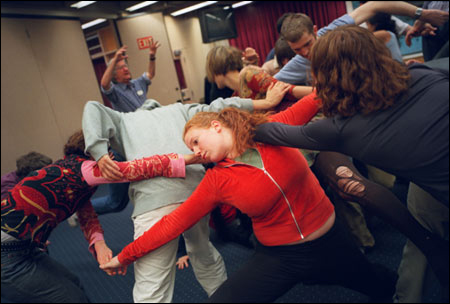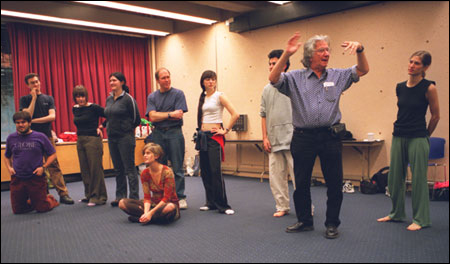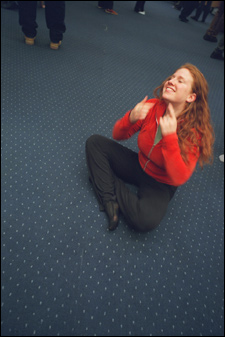Augusto Boal’s ‘Theatre of the Oppressed’
‘To be blunt, I am trying to seduce you into doing this work on the outside.’

Oppression, according to Augusto Boal, is when one person is dominated by the monologue of another and has no chance to reply. Boal’s life is devoted to giving those who are in this one-down position the tools with which to express themselves and discover a way out of their powerlessness.
He does this through the medium of theater. A native of Brazil who has been jailed himself for his political activities, Boal is the founder of a movement known as “Theatre of the Oppressed.” He is at Harvard Dec. 5-12 conducting a series of workshops with students, teachers, theater artists, and community members, culminating in a forum and presentation on Thursday (Dec. 11), in which members of the community will have a chance to react to work developed by Boal and the participants.
While the words “Theatre of the Oppressed” may suggest something heavy and dirge-like, Boal’s presence soon dispels such preconceptions. Buoyant and encouraging, his face framed by an unruly silver mane, he quickly connects with the participants in his workshop through a series of stories whose implications seem to go beyond their apparent simplicity.

“I have taught in prisons,” he said. “I worked with the guardians as well as the prisoners because the prison oppresses them, too. At the end, I asked one of the guardians, ‘What did you learn about human rights?’ ‘Absolutely nothing,’ he said. ‘The only thing I learned is that the prisoners are not animals. They are human beings like myself.’”
As the founder of a movement that has become worldwide in scope, Boal is also frank about his hopes for the people who are touched by his teaching.
“To be blunt, I am trying to seduce you into doing this work on the outside. In the university, you are cut off from the outside world. I want you to take what you learn here and bring it to the outside.”
The key to Boal’s theater is the “spect-actor,” an audience member who is invited onstage to take part in the drama. Working mostly in poor communities, Boal serves as a facilitator to help volunteers create dramas around problems that affect their lives. At the performance, audience members are free not only to comment on the action, but also to step up on stage and play roles of their choice. In doing so, they discover new ways of resolving the dilemmas that the play presents. In follow-up exercises, community members learn how to translate these insights into social action.

“What looks like destiny turns out to be a problem with different possible outcomes. He guides frustration and despair into creative intervention and then into legislative and civic intervention,” said Doris Sommer, professor of Romance languages and literatures and director of Cultural Agency, an initiative at the David Rockefeller Center for Latin American Studies, one of the organizations at Harvard sponsoring Boal’s residency.
The other sponsors are the Office for the Arts, the American Repertory Theatre, the Graduate School of Education’s Arts in Education Program Bryant Lecture/Performance Series, and the Radcliffe Institute for Advanced Study.
Boal’s work was the inspiration for Cultural Agency, said Sommer. The initiative was launched last year as an effort to bring together artists and scholars to make positive contributions to civil society.
“Students who are interested in the humanities sometimes become discouraged because they don’t see the contribution they can make,” said Sommer. “We tell them, no, you are precisely what is needed to make social investments, to develop a web of cultural activities that weaves together civil society.”
Cultural Agency carries out this work by hosting conferences, lectures, and workshops, and by coordinating internships, publications, and academic learning with community service.




